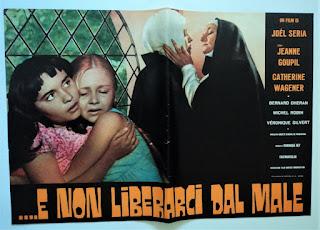
Don’t Deliver Us From Evil doesn’t waste any time, introducing us to the twisted thinking of lead character Anne (Jeanne Goupil) immediately after the opening credits.
It’s nighttime at a Catholic boarding school. A nun makes her way past the sleeping girls. Anne, however, is not actually asleep.
The nun walks behind a drawn curtain and undresses as Anne, now turned onto her side, watches. The curious young girl then hides under her covers and grabs her journal, where she makes the following entry:
“Friday, 29th June… a good day. Celine Crespin got the blame for me fooling around in class. She’ll be kept in on Sunday. I confessed two sins of impurity that I hadn’t committed. That really gave me a thrill. Lore and me get such pleasure when we do something wrong. To sin has become our chief aim. Let the other idiots live their lives doing good. We shall dedicate our lives to Satan, our lord and master.”
And with that, this 1971 French film by first-time writer / director Joel Seria is off and running.
Anne and her best friend Lore (Catherine Wagener) get into all sorts of mischief, which they manage to hide from their teachers as well as their parents. Doing everything from collecting eucharist hosts and stealing a chalice from the sacristy (both of which they intend to use in an upcoming Satanic ritual) to antagonizing the farmer’s son Emile (Gerard Darrieu), the girls delight in the chaos they create.
It isn’t long, however, before their friendship leads them to bigger crimes, including arson and even torture.
For Anne and Lore, flirting with older men and spying on their teachers is nothing more than good fun. Until the night they take things a bit too far, an incident that could bring their entire world crashing down around them.
Based in part on the Parker – Hulme murder case in 1950’s New Zealand (the very same killing that inspired Peter Jackson’s excellent 1994 film Heavenly Creatures), Don’t Deliver Us From Evil is, at times, a shocking movie, both in the sexually explicit behavior of its two leads (though they portray teen girls, both actresses were nearly 20 when the movie was made) and the lengths (and depths) they go to in proving themselves worthy of a life dedicated to Satan. Perhaps the movie’s most chilling scene comes when Anne and Lore sneak into the room of Leon (Michel Robin), a caretaker at Anne’s estate, and poison his pet canary (the camera lingers on the poor creature as it convulses and then dies).
Not even the near-miss of Lore being raped by Emile (after playfully showing off her body to him) is enough to slow them down. To get back at Emile, they visit his family’s farm one night and set fire to the haystacks in the field as well as all the hay in the barn.
There are moments scattered throughout Don’t Deliver Us From Evil in which director Seria takes aim at what he sees as the rigid morality of the Catholic faith, and the effect it can have on stirring up rebellion; at one point Anne and Lore, who have snuck into the convent, hide from two nuns running down the hall, giggling. The two sisters eventually make their way to a secluded room, where Anne and Lore, peering through the keyhole, see them kissing one another. This comes just after a scene in which the priest, during mass, delivers a stern sermon on lust, and how it is the most deadly of the seven sins (in a humorous scene, Anne has a fantasy of the priest delivering his homily naked, and being laughed at by the parishioners).
Don’t Deliver Us From Evil is not an easy movie to sit through. It was banned in its native France and given an “X” rating in Britain (it also never played theatrically in the United States). But if you can look past some of its more troubling aspects (the on-screen death of an animal is never pleasant), it is a well-made, well-acted film, relating a story of friendship that crosses into obsession, and of two girls who have discovered a unique and horrific way to stave off the boredom of their restrictive lives.
Rating: 9 out of 10
